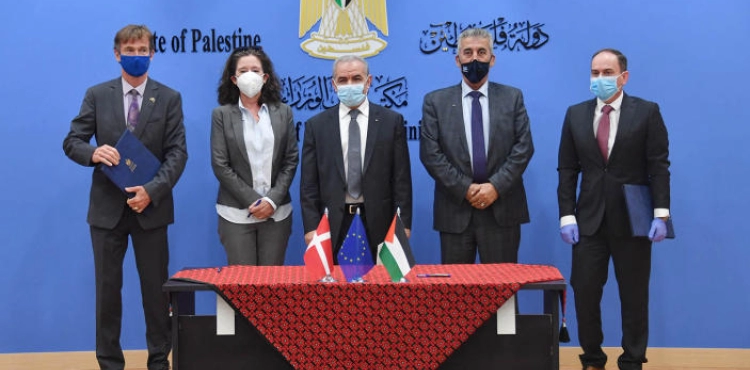Minister of Local Government Magdi Al-Saleh, today, Tuesday, the European Union representative to Palestine Sven Cohan von Burgsdorf, in the presence of the representative of Denmark Natalia Weinberg and the representative of the Municipal Development and Lending Fund Mahmoud Al-Ramahi, signed an agreement worth 5.8 million euros from the European Union And Denmark, in the presence and patronage of Prime Minister Muhammad Shtayyeh, in Ramallah.
The agreement provides for the implementation of the package, which is the fifth of its kind to serve public infrastructure projects in Area C. The package will also finance 16 social infrastructure projects in 15 regions in the West Bank, benefiting more than 24,000 citizens living in Area C.
The Prime Minister said: "The projects funded by the European Union and its countries intersect with Palestinian national priorities significantly, the foremost of which is strengthening the steadfastness of our people in Area C, which the occupation wants to annex and emptied of its residents, and this grant will be implemented in 15 regions distributed in various governorates The West Bank, which includes construction of schools, roads, public buildings, water distribution networks, water tanks, and repair of electricity networks. "
He added: "This package of projects represents a practical European response to the Israeli annexation plans, which is a clear message consistent with the European position rejecting the annexation plans for Israel."
The Prime Minister continued: "For us, there is no classification (A, B, C), which are all the lands of our Palestinian state, which Israel systematically tries to destroy its foundations through the siege of Gaza, the isolation of Jerusalem, the use of lands (C) as a geographical reservoir for settlement expansion, and the threat of annexation of the Jordan Valley. ".
In turn, the Minister of Local Government said: "We put the development of our regions and support the steadfastness of our people as a top priority for the government, in cooperation with international partners, and the provision of basic services in areas (C) that suffer from the occupation measures is our duty that we will not fall behind."
Al-Saleh stressed that this agreement is of special importance because it supports Palestinian efforts in facing the Israeli policy of annexation and expansion aimed at destroying the last remaining political process.
For his part, the representative of the European Union to Palestine said: "The European Union considers Area C an integral part of the occupied Palestinian territories. This position has been expressed for many years, and it is translated into projects and agreements like the ones we launch today. One of the fundamental rights of every Palestinian In the occupied Palestinian territories to obtain social services and economic infrastructure such as water, electricity, roads, schools and clinics. We support the Palestinian Authority, in cooperation with member states of the European Union, in meeting these needs ...
Von Bergsdorf explained: "We will not recognize any changes to the pre-1967 borders, including with regard to Jerusalem, other than those agreed upon by both sides, and we do not recognize Israel´s sovereignty over the occupied territories since 1967. We remain committed to a just and negotiated solution based on On the existence of two states, which is the only way to achieve peace, development, security and safety. "
The representative of Denmark added, "The support provided by the Danish government is through the development program in region (C) of the European Union in the West Bank. The European Union and the member states of the European Union support the development interventions in region (C) initiated by the Ministry of Government The local Palestinian community and promoted it in line with the commitment of the European Union to achieve a two-state solution. "












